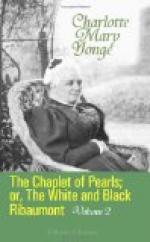At the conference of gentlemen held at Quinet, he had been startled by hearing the name of the Sieur de Bellaise, and had identified him with a grave, thin, noble-looking man, with an air of high-bred and patient poverty. He was a Catholic but no Guisard, and supported the middle policy of the Montmorency party, so far as he possessed any influence; but his was only the weight of personal character, for he had merely a small property that had descended to him through his grandmother, the wife of the unfortunate Bellaise who had pined to death in the dungeon at Loches, under Louis XI. Here, then, Berenger saw the right means of riding himself and his family of the burthen that his father had mourned over, and it only remained to convince Eustacie. Her first feeling when she heard of the King’s offer, was that at last her ardent wish would be gratified, she should see her husband at the head of her vassals, and hear the war-cry motto ‘A moi Ribaumont.’ Then came the old representation that the Vendeen peasants were faithful Catholics who could hardly be asked to fight on the Calvinist side. The old spirit rose in a flush, a pout, a half-uttered query why those creatures should be allowed their opinions. Madame la Baronne was resuming her haughty temperament in the noblesse atmosphere; but in the midst came the remembrance of having made that very speech in her Temple ruin—of the grave sad look of rebuke and shake of the head with which the good old minister had received it—and how she had sulked at him till forced to throw herself on him to hinder her separation from her child. She burst into tears, and as Berenger, in some distress, began to assure her that he would and could do nothing without her consent, she struggled to recover voice to say, ’No! no! I only grieve that I am still as wicked as ever, after these three years with that saint, my dear father. Do as you will, only pardon me, the little fierce one!’
And then, when she was made to perceive that her husband would have to fight alone, and could not take her with him to share his triumphs or bind his wounds, at least not except by bringing her in contact with Henry of Navarre and that atmosphere of the old court, she acquiesced the more readily. She was a woman who could feel but not reason; and, though she loved Nid de Merle, and had been proud of it, Berenger’s description of the ill-used Sieur de Bellaise had the more effect on her, because she well remembered the traditions whispered among the peasants with whom her childhood had been passed, that the village crones declared nothing had gone well with the place since the Bellaise had been expelled, with a piteous tale of the broken-hearted lady, that she had never till now understood.




